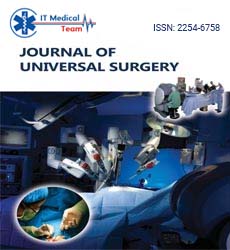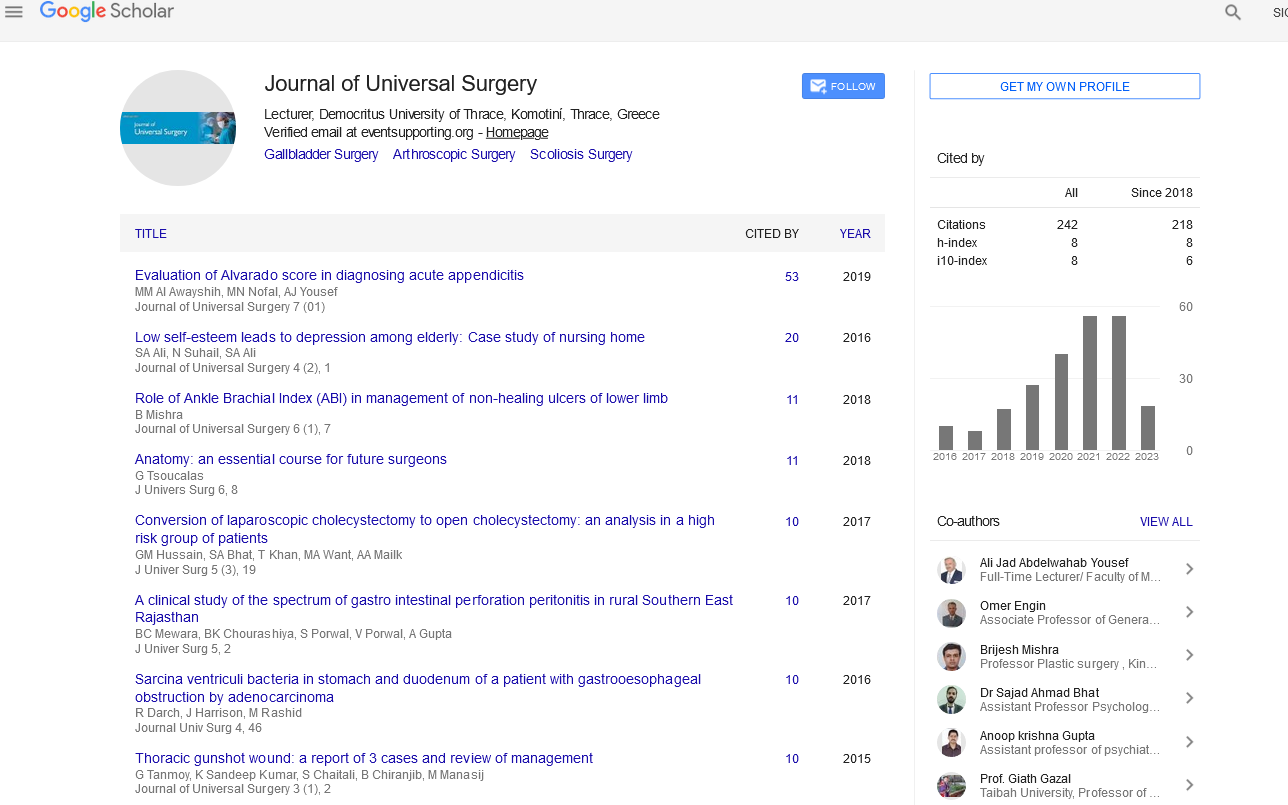Editorial - (2022) Volume 10, Issue 12
A Short Note on Colorectal Cancer and Surgery
Dr. Samuel Zeack*
Department of Colorectal and Oral Surgeon, Pediatric & Colorectal Surgery Hospitals, Iceland
*Correspondence:
Dr. Samuel Zeack, Department of Colorectal and Oral Surgeon, Pediatric & Colorectal Surgery Hospitals,
Iceland,
Email:
Received: 02-Dec-2022, Manuscript No. IPJUS-22-13338;
Editor assigned: 05-Dec-2022, Pre QC No. IPJUS-22-13338 ()PQ;
Reviewed: 19-Dec-2022, QC No. IPJUS-22-13338;
Revised: 23-Dec-2022, Manuscript No. IPJUS-22-13338 (R);
Published:
30-Dec-2022, DOI: 10.36648/2254-6758.22.12.83
Abstract
Colorectal surgery is an established super specialty in most parts of the world. However, in India, this is yet to be recognized as a separate super specialty. Colorectal surgery has a vast scope and needs dedicated training to treat complex colorectal diseases. There is enough scientific evidence to prove that outcomes for such diseases are improved in the hands of dedicated colorectal surgeons. So far in India, the process of granting it the status of a separate super specialty has been initiated but it needs further efforts to formally do so and also start super specialty courses such as MCh/DNB in the field. In this review, we will give a brief historical background of the specialty of colorectal surgery, the scope of colorectal surgery, the scientific evidence to prove that better patient outcomes are achieved in the hands of dedicated colorectal surgeons and finally the journey of efforts that have been carried so far for recognizing this as a separate super specialty in our country. Colorectal surgery has been rapidly evolving over the last few years. Newer technologies and techniques are increasingly being used and have become part of surgical armamentarium. Indeed, much needs to be explored in the field of coloproctology, as the desire to shed light on grey areas is constantly growing, in parallel with the implementation of innovations into clinical practice. The aim of the present Topical Collection is to serve as a forum for critically addressing how the advent of recent technological developments has impacted the outcomes of colorectal surgery, the way patients are managed perioperatively, postoperative recovery, and patient experience throughout an operation. Manuscripts are invited critically assessing the role of minimally invasive approaches, application of artificial intelligence and big data to decision making, peroperative patient optimization, application of transational research in coloproctology, or comparing the outcomes of different innovative approaches to colorectal diseases.
Patients undergoing colorectal surgery experience a physiologic stress response and are at risk of complications and delayed recovery. Attempts to improve recovery have tended to focus on the intraoperative period and the immediate postoperative period (Enhanced Recovery after Surgery, ERAS, and pathways). ERAS reduced overall morbidity, length of hospital stay, and costs by incorporating multimodal optimization of perioperative care first in colorectal surgery and then also in other fields of surgery.
Keywords
Colorectal surgery; Separate; Super specialty; Surgical treatment
INTRODUCTION
Surgical treatment for colorectal conditions continues to be
more common and costlier. Research on non-surgical methods
for reducing complications and perioperative care for improving
outcomes is gaining prominence. An important element of
perioperative care includes ‘prehabilitation,’ a concept relatively
new to abdominal surgery, and defined as the process of enhancing an individual’s physical functioning before surgery to
improve their recovery from surgical stress. There is burgeoning
evidence that optimizing preoperative health is a promising
approach to improving patient outcomes and reducing costs
across the perioperative period among patients with colorectal
cancer [1].
Colorectal surgery is an established super specialty in the west
and other developed nations, however in India, though it is
upcoming but is still considered a part of general surgery. Colon
and rectal surgery is one of the oldest recognized specialties.
Writings dating as early as 1250 B. C. dealt with anorectic diseases
and indicate there were practitioners devoted to this specialty.
The history of colorectal surgery is a fascinating journey of
continual innovation that spans regions globally and emphasizes
the significant advances made in the field. Various ointments,
suppositories, and enemas were used by ancient Egyptians for
the treatment of diseases of the colon. Greeks performed surgery
in the form of cautery, sewing and binding [2]. Later, Romans
encouraged the use of surgery for treating perianal fistulas.
Surgut about 1000–2000 BC in his Sushrut Samhita described
Incision and Drainage of Perianal Abscesses. He also described
ligation of piles and devised instruments for anorectal surgery.
Patients undergoing colorectal surgery experience a physiologic
stress response and are at risk of complications and delayed
recovery. Attempts to improve recovery have tended to focus
on the intraoperative period and the immediate postoperative
period (Enhanced Recovery after Surgery, ERAS, pathways). ERAS
reduced overall morbidity, length of hospital stay, and costs by
incorporating multimodal optimization of perioperative care first
in colorectal surgery and then also in other fields of surgery [3].
Much of the literature on preoperative care among abdominal
surgery patients has focused on singular aspects of prehabilitation
in cancer care. However, addressing multiple modifiable
behavioural risk factors may provide stronger benefits to patients
through synergistic effects on health. Considering multiple
interdependent domains of health to improve patients’ surgical
outcomes, particularly quality of life, is consistent with broader
recommendations for effective chronic disease management and
high-quality care. Some recent literature is starting to explore
the concept of multimodal prehabilitation in colorectal cancer,
but the science regarding its effective elements is still nascent.
Indeed, the only first international randomized control trial for
multimodal prehabilitation in colorectal cancer surgical patients
is underway. This type of complex intervention aims to address
multiple modifiable lifestyle factors (e.g. exercise, smoking, diet)
during the pre-operative period (extending the peri-operative
Enhanced Recovery after Surgery, ERAS) [4].
The beginning of modern colorectal surgery began in England in
1835, when Frederick Salmon decided to found his own institution
named the “Infirmary for the Relief of the Poor afflicted with
Fistula and other Diseases of the Rectum,” which was later on
expanded as the St. Mark's Hospital, London on 25 April 1854.
Salmon remained the only surgeon at the Hospital until his
retirement in 1859, when he was succeeded by two surgeons
carefully chosen to carry on his work [5]. His most notable
successors at St. Marks were William and Herbert Allingham, both of whom helped create the specialty of proctology and
continued the successful development of the hospital.
Colorectal cancer
Incidence of colorectal cancer (CRC) in India has increased many
folds in the past few decades and is expected to increase further
in coming years due to increase in urbanization and rapid changes
in lifestyle among the population. Another worrisome issue
is the higher incidence of CRC among young patients.[4] This
group of patients present more challenge to a surgeon because
of their aggressive disease and on top of that their expectations
to preserve their sphincters and sexual function [6]. Apart from
malignancies, outcomes for benign colorectal diseases are better
in the hands of a dedicated colorectal surgeon as compared
to general surgeon. A study from Arizona, USA included
patients undergoing procedures for benign diseases including
abscess drainage, hemorrhoidectomy, fistulectomy, and bowel
resections. The population was divided into two groups based on
the location of treatment into urban and rural. Various outcome
measures that were studied included short-term complications,
mortality, and hospital treatment costs. Urban centers (UC) were
further divided into centers with colorectal surgeons and centers
without colorectal surgeons [7]. A total of 20,617 patients who
underwent different surgical procedures for benign colorectal
diseases across 496 centers, were included. More than onethird
of centers among 342 UCs had colorectal surgeons. After
analysing the results, they found that complication rate was low
in patients managed at UC, hospital length of stay was shorter
and hospital treatment costs were higher as compared to rural
centers. On subanalysis, patients managed in UC with colorectal
surgeons had lower incidence of short-term complications and a
shorter hospital stay when compared with patients managed in
UC without colorectal specialization. They concluded that there
are disparities in outcomes of patients with benign colorectal
diseases managed surgically in urban versus rural centers.
Further, specialized care with colorectal surgeons at UC helps in
reducing adverse patient outcomes [8, 9].
With more and more knowledge and dedicated experience
about CRC, more sphincter saving options have been offered to
patients such as intersphincteric resections, ultralow anterior
resections, TaTME, TAMIS, TEMS depending on the stage of their
presentation. However, all this can be done only once a surgeon
has a dedicated high volume experience with such procedures
[10].
Conclusion
The concept of super specialization is gaining importance and is
growing in every medical field throughout the world. Specialization
in various fields of surgery has evolved to provide better care to
patients. Specialization provides state-of-art knowledge and care
of complex areas, high volumes of routine procedures besides
imparting better training and education to postgraduates. The
controversy over specialization in surgery has existed since
decades, but still newer subspecialties have emerged.
We found an unmet need for preoperative support for patients
waiting for colorectal surgery. There was a strong patient preference for improving mental/emotional health and wellbeing
and need for personalised and reliable information that clarified
the role of lifestyle modification as preoperative care could
improve for surgical outcomes. Since patients’ concerns and
needs varied considerably, some personalization and flexibility
are needed in future interventions so that patients could choose
the amount and type of preoperative support they received. This
study can help inform future research, policy and delivery of
patient-centred multimodal prehabilitation for colorectal surgery,
and highlights that multimodal prehabilitation should incorporate
patient preferences.
Acknowledgement
None
Conflict of Interest
None
References
- Dean Meara, Ramsay Robert, Heriot Alexander, Mackay John, Hiscock Richard Lynch, et al. (2017) Warmed, humidified CO2 insufflation benefits intraoperative core temperature during laparoscopic surgery: A meta-analysis. Asian J Endosc Surg 10: 128-136.
Indexed at, Google Scholar, Crossref
- Ma Y, Yang Z, Qin H, Wang Y (2011) A meta-analysis of laparoscopy compared with open colorectal resection for colorectal cancer. Medical Oncology 28: 925-933.
Indexed at, Google Scholar, Crossref
- Semm K (1983) Endoscopic appendectomy. Endoscopy 15: 59-64.
Indexed at, Google Scholar, Crossref
- Katz Aviva L, Webb Sally A, Macauley, Robert C, Mercurio Mark R, et al. (2016) Informed Consent in Decision-Making in Pediatric Practice. Pediatrics 138: 14-85.
Indexed at, Google Scholar, Crossref
- Mazur Kate A, Berg Stacey L, (2020) Ethical Issues in Pediatric Hematology. Oncology 13-21.
Indexed at, Google Scholar, Crossref
- Stern, Alexandra Minna, Markel Howard (2002) Formative Years: Children's Health in the United States, 1880-2000. UMHS 23-24.
Indexed at, Google Scholar, Crossref
- Martakis K, Schröder-Bäck P, Brand H (2018) Developing child autonomy in pediatric healthcare: towards an ethical model. Arch Argent Pediatr 116: 401-408.
Indexed at, Google Scholar, Crossref
- Brill S, Gurman GM, Fisher A (2003) A history of neuraxial administration of local analgesics and opioids. European Journal of Anaesthesiology 20: 682-689.
Indexed at, Google Scholar, Crossref
- Reddy S, Patt RB (1994) the benzodiazepines as adjuvant analgesics. J Pain Symptom Manag 9: 510-514.
Indexed at, Google Scholar, Crossref
- Mallinson T (2019) Fascia iliaca compartment block: a short how-to guide. J Paramed Pract 11: 154-155.
Google Scholar, Crossref
Citation: Zeack S (2022) A Short Note on Colorectal Cancer and Surgery. J Uni Sur, Vol. 10 No. 12: 83.





